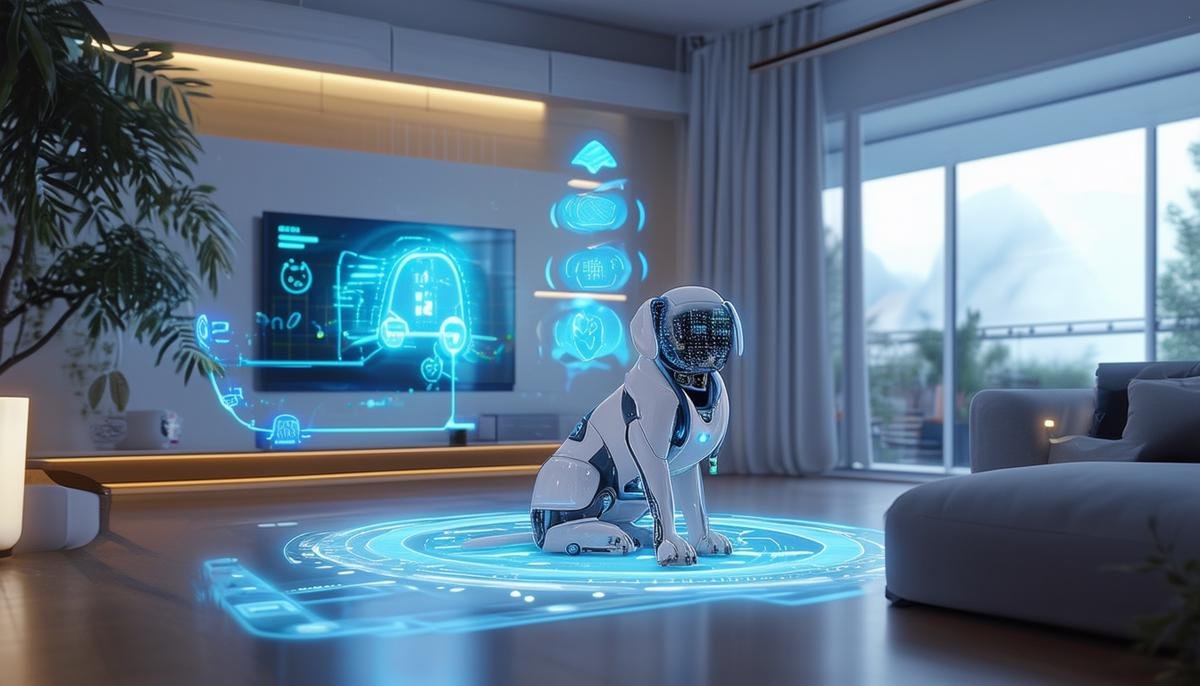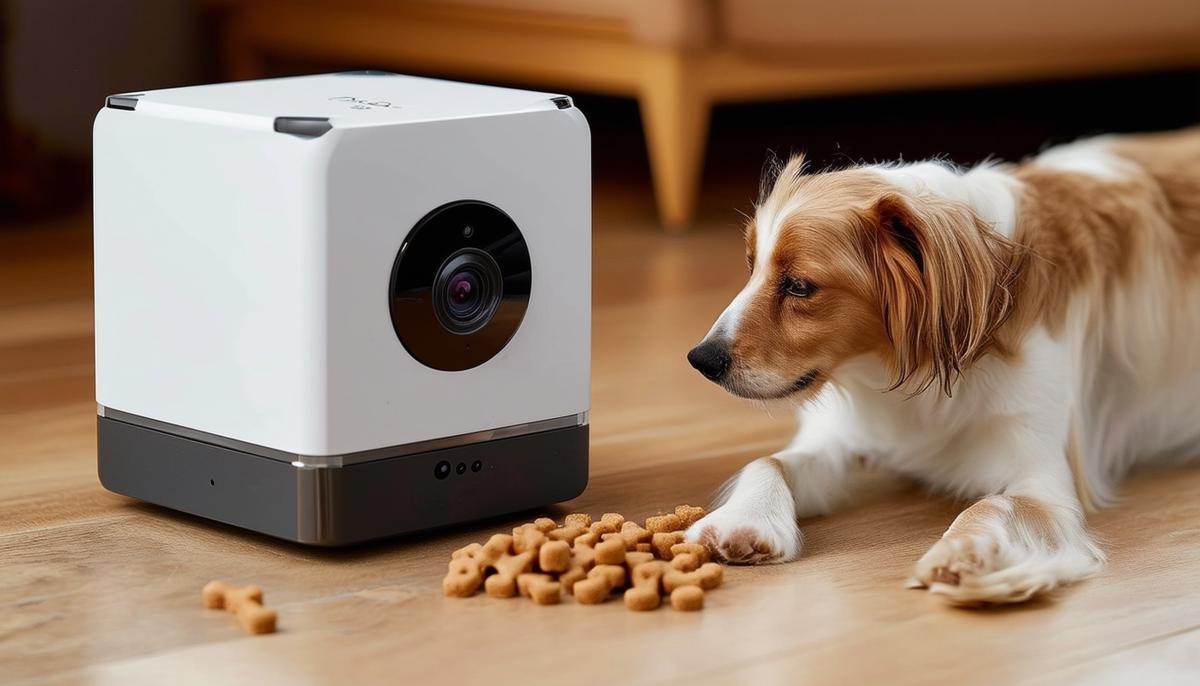Petcube’s AI-powered pet cameras bring advanced technology to pet care, combining practical features with smart monitoring. These devices offer a range of functionalities designed to keep pets safe, entertained, and connected with their owners, even when they’re apart.
Understanding Petcube’s AI Technology
Petcube’s AI-Powered Pet Cameras feature a wide-angle lens, two-way audio, and video history. The intelligent alert system detects unusual noises like abnormal barking or meowing, allowing owners to check in and act promptly.
The cameras distinguish between cats and dogs, offering specialized features for each:
- For cats: A smart laser-pointer toy to keep them engaged
- For dogs: A built-in treat dispenser, operable remotely for training or soothing purposes
Petcube Care allows owners to capture 30-second video clips triggered by motion or sound, providing a highlighted reel of the pet’s day. The technology integrates with other smart home devices like Amazon Alexa, adding voice command capabilities.
Pet detection technology enables pets to “make calls” to their owners. When a pet gets in front of the camera, it triggers a video recording, essentially allowing the pet to send a selfie video. This feature strengthens the bond between pets and owners, even when separated by distance.
Comparing Petcube with Other AI Pet Cameras
While Petcube offers a comprehensive user experience, other AI pet cameras have unique features worth considering:
| Camera | Key Features |
|---|---|
| PetChatz | Digital daycare service, smart motion-and-sound triggered video recording, aromatherapy delivery |
| Furbo Dog Camera | Dog-specific, action recognition system, alerts for unusual activities |
| PetPace | Smart collars providing vital health metrics |
| TTcare | AI analysis of pet photos for health monitoring, no real-time video |
| ORo | Robot for feeding, training, and entertaining pets, lacks real-time connectivity |
Petcube distinguishes itself with its seamless integration of practical features and advanced AI capabilities, balancing entertainment, training, and safety monitoring for pets.
Real-Life Applications and Success Stories
Petcube has proven its value in real-life situations:
- A dog owner received a smart alert about broken glass, allowing them to have a roommate clean up before the pet was injured.
- An asthma attack in a cat named Ziggy was detected through Petcube Care alerts, enabling timely medical intervention.
- A vacationing couple identified severe hives on their dog using the camera’s zoom feature, allowing them to return home for emergency veterinary care.
Users have reported reduced pet anxiety and improved quality of life. The treat dispenser has helped address separation anxiety in dogs, while the laser-pointer toy has kept cats active and mentally stimulated when home alone.
These examples demonstrate how Petcube’s technology transforms potential emergencies into manageable situations and enhances daily pet care routines.
The Role of AI in Pet Health Monitoring
AI technologies are advancing pet health monitoring, offering early detection of illnesses and reducing the need for emergency vet visits. Two notable examples are:
PetPace
A smart GPS-enabled collar that monitors vital biometrics including calories burned, sleep quality, stress levels, temperature, respiration, and pulse. It creates a ‘biometric profile’ for each pet and sends alerts if deviations occur. With over 90 percent accuracy in detecting irregular metrics, it serves as an early warning system.1
TTcare
An AI-driven app that analyzes photos of pets’ eyes, skin, teeth, and joints against a vast database, providing a health status with up to 93 percent accuracy.2 It offers swift feedback, detecting subtle changes that might otherwise go unnoticed.
These technologies empower pet owners with accurate, real-time health insights, fostering a more proactive approach to pet care. By enabling early intervention and continuous monitoring, AI tools in pet health monitoring are improving the overall well-being of pets.
Ethical and Privacy Concerns
AI-driven pet care advancements offer benefits but also raise concerns. Data security and privacy are primary issues, as AI pet care devices collect personal and pet-related data. This information could be vulnerable to breaches if not properly secured.
Lionel Robert from the University of Michigan emphasizes the need to address these security concerns. Manufacturers must adhere to stringent data protection protocols, including:
- Encryption techniques
- Regular security audits
- Transparent data handling policies
Ethical concerns include the risk of diminishing the human-animal bond. Philip Tedeschi, co-director of the Institute for Animal Sentience and Protection, warns against over-dependence on technology. He advocates for a balanced approach where AI enhances, rather than replaces, human interaction.
To mitigate these concerns, pet tech companies should design products that encourage human interaction. Features like two-way audio in cameras can maintain connection when owners are away, while interactive toys should supplement real playtime.
Another challenge involves the accurate interpretation of pet behaviors. AI algorithms might misinterpret actions or sounds, potentially leading to unnecessary anxiety or incorrect medical interventions. Ongoing training and improvement of AI algorithms, along with collaboration with veterinarians and animal behaviorists, can help refine these technologies.

Future of AI in Pet Care
AI-driven pet care innovations are advancing rapidly, offering enhanced health monitoring, improved communication, and deeper connections between pets and owners. Disease-detecting smart collars, like those developed by PetPace, provide comprehensive health analysis. These devices monitor vital signs and may soon integrate more sophisticated diagnostic tools.
Pet translators aim to bridge the communication gap between humans and animals. Apps like MeowTalk use AI to interpret cat vocalizations, with the potential to extend to other species. This technology could transform training and behavioral management.
The pet tech industry is growing significantly. Consider these statistics:
- Americans spent $147 billion on their pets in 2023, up from $90 billion in 2018
- Experts predict the global pet sector could reach $500 billion by 2030
This expansion highlights a shift towards integrating advanced technology into pet care practices.
As smart devices become more accessible, pet care will transform into a tech-assisted, proactive process. Future households may commonly include:
- Automated feeders
- Interactive toys
- Health-monitoring collars
- Robotic companions
However, responsible development and deployment of AI in pet care is crucial. Ethical considerations, data privacy, and ensuring technology supplements rather than replaces human-pet interactions are important factors to manage in this evolving landscape.

Petcube’s AI-powered cameras provide interactive, responsive monitoring that keeps pets safe and engaged when owners are not around. These devices offer features such as:
- Real-time video streaming
- Two-way audio communication
- Motion detection alerts
- Treat dispensing capabilities
By combining these elements, Petcube creates a comprehensive solution for remote pet care and interaction.





